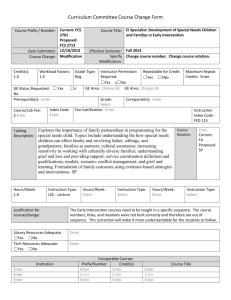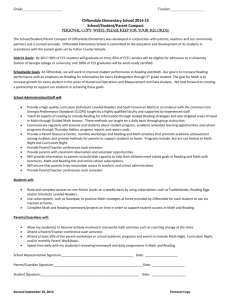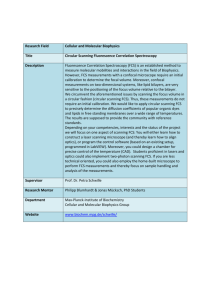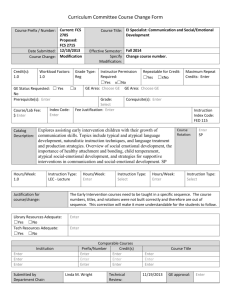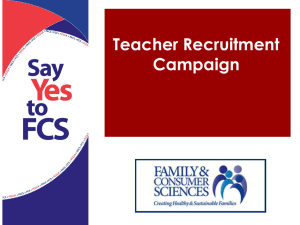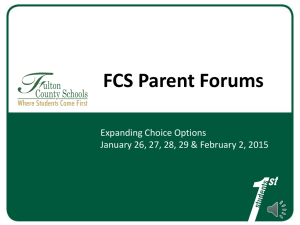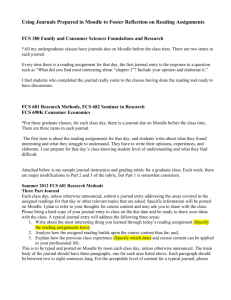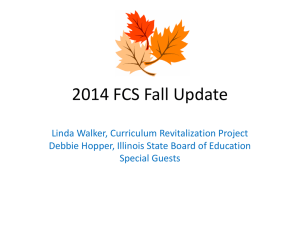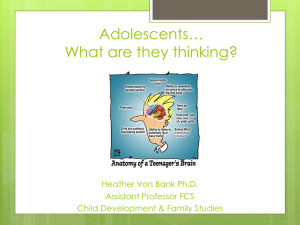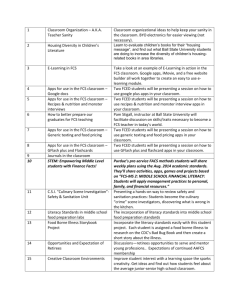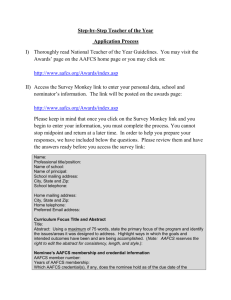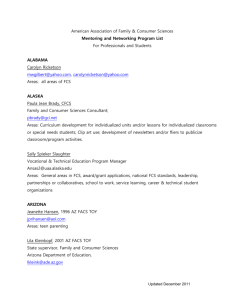KS MATH Assessments - American Association of Family
advertisement
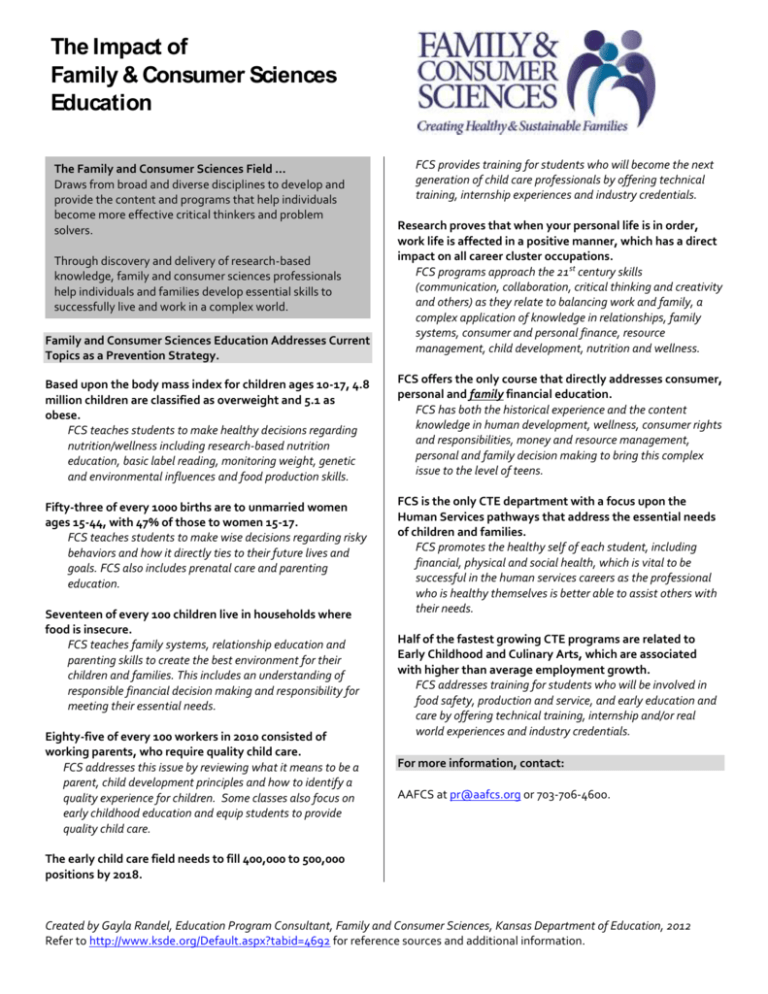
The Impact of Family & Consumer Sciences Education The Family and Consumer Sciences Field … Draws from broad and diverse disciplines to develop and provide the content and programs that help individuals become more effective critical thinkers and problem solvers. Through discovery and delivery of research-based knowledge, family and consumer sciences professionals help individuals and families develop essential skills to successfully live and work in a complex world. Family and Consumer Sciences Education Addresses Current Topics as a Prevention Strategy. FCS provides training for students who will become the next generation of child care professionals by offering technical training, internship experiences and industry credentials. Research proves that when your personal life is in order, work life is affected in a positive manner, which has a direct impact on all career cluster occupations. FCS programs approach the 21 st century skills (communication, collaboration, critical thinking and creativity and others) as they relate to balancing work and family, a complex application of knowledge in relationships, family systems, consumer and personal finance, resource management, child development, nutrition and wellness. Based upon the body mass index for children ages 10-17, 4.8 million children are classified as overweight and 5.1 as obese. FCS teaches students to make healthy decisions regarding nutrition/wellness including research-based nutrition education, basic label reading, monitoring weight, genetic and environmental influences and food production skills. FCS offers the only course that directly addresses consumer, personal and family financial education. FCS has both the historical experience and the content knowledge in human development, wellness, consumer rights and responsibilities, money and resource management, personal and family decision making to bring this complex issue to the level of teens. Fifty-three of every 1000 births are to unmarried women ages 15-44, with 47% of those to women 15-17. FCS teaches students to make wise decisions regarding risky behaviors and how it directly ties to their future lives and goals. FCS also includes prenatal care and parenting education. FCS is the only CTE department with a focus upon the Human Services pathways that address the essential needs of children and families. FCS promotes the healthy self of each student, including financial, physical and social health, which is vital to be successful in the human services careers as the professional who is healthy themselves is better able to assist others with their needs. Seventeen of every 100 children live in households where food is insecure. FCS teaches family systems, relationship education and parenting skills to create the best environment for their children and families. This includes an understanding of responsible financial decision making and responsibility for meeting their essential needs. Eighty-five of every 100 workers in 2010 consisted of working parents, who require quality child care. FCS addresses this issue by reviewing what it means to be a parent, child development principles and how to identify a quality experience for children. Some classes also focus on early childhood education and equip students to provide quality child care. Half of the fastest growing CTE programs are related to Early Childhood and Culinary Arts, which are associated with higher than average employment growth. FCS addresses training for students who will be involved in food safety, production and service, and early education and care by offering technical training, internship and/or real world experiences and industry credentials. For more information, contact: AAFCS at pr@aafcs.org or 703-706-4600. The early child care field needs to fill 400,000 to 500,000 positions by 2018. Created by Gayla Randel, Education Program Consultant, Family and Consumer Sciences, Kansas Department of Education, 2012 Refer to http://www.ksde.org/Default.aspx?tabid=4692 for reference sources and additional information. The Role of Family & Consumer Sciences Education The Family and Consumer Sciences Field … Draws from broad and diverse disciplines to develop and provide the content and programs that help individuals become more effective critical thinkers and problem solvers. Through discovery and delivery of research-based knowledge, family and consumer sciences professionals help individuals and families develop essential skills to successfully live and work in a complex world. Family and Consumer Sciences Education and the Career Clusters Family and consumer sciences education provides the essential life skills to develop healthy people who are prepared to meet the needs of their children and families or those with whom they work. Family and consumer sciences education teaches the 21st century skills as they relate to balancing work and family. Family and consumer sciences also builds the 21st century career and technical education skills through the career clusters. FCS courses are found within the following thirteen career clusters (varies by state): Agriculture, Food and Natural Resources Architecture and Construction Arts, AV Technology and Communications Business Management and Administration Education and Training Finance Government and Public Administration Health Science Hospitality and Tourism Human Services Law, Public Safety, Corrections and Security Marketing STEM FCS careers introduced include early childhood educators, geriatrics professionals, social workers, family counselors, credit counselors, nutrition educators and dietitians, restaurant and event managers, interior and textile designers and food scientists. Family and Consumer Sciences Education and STEM The field of family and consumer sciences, founded as home economics, had its beginnings in 1899 when Ellen Swallow Richards, one of the first female graduates and female faculty members of the Massachusetts Institute of Technology (MIT), led the way to use scientific knowledge to address water quality, food safety and safety of home environments. FCS education addresses STEM through the living sciences including: 1) food science and innovation, 2) nutrition and wellness; 3) interior/textiles technologies; 4) environmental practices and 5) early childhood education and parenting, which promotes early STEM skills in children. Family, Career and Community Leaders of America (FCCLA) Students can expand and/or demonstrate their 21st century and technical skills within FCCLA. FCCLA is embedded within the FCS classroom, which allows the members to address individual, family and/or community needs in authentic experiences that promotes 21st century skills, personal growth and leadership development. (For more information, refer to www.fcclainc.org) Family and Consumer Sciences Education Needs You to Make the connection between the issues of society and the prevention education role that FCS can have. See the connection of family and consumer sciences to the career clusters, Understand the complexity of addressing the essential needs of children, individuals and families. Realize family and consumer sciences has the background training to impact behaviors in students today and workforce of tomorrow. Take a stand and ensure family and consumer sciences education is a part of every school in America. Step up to this challenge and speak out for FCS education by strengthening and/or reinstating it in the educational system and CTE arena. For more information, contact: AAFCS at pr@aafcs.org or 703-706-4600. Created by Gayla Randel, Education Program Consultant, Family and Consumer Sciences, Kansas Department of Education, 2012 Refer to http://www.ksde.org/Default.aspx?tabid=4692 for reference sources and additional information.
